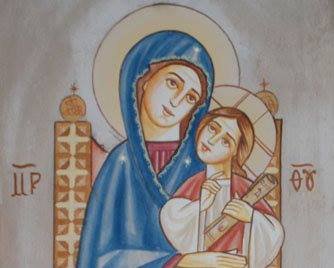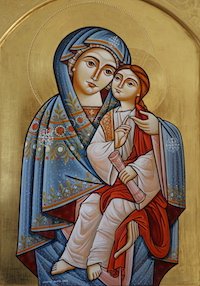
The Virtues of the Virgin Mary
 LIFE OF HUMILITY
LIFE OF HUMILITY
Humility was a fundamental condition for her of whom the Lord of Glory would be born.
It was indispensable that He would be born from a humble person; who could bear the glory of the divine Incarnation but her? The glory of the coming of the Holy Spirit in her? The glory of the nativity of the Lord from her? The glory of all the generations blessing her? The humility of Elizabeth in front of her when she said to her: “But why is this granted to me, that the mother of my Lord should come to me?” (Luke 1:43). Likewise to bear the glory of all the apparitions of angels, and the worship of the Magii in front of her Son, and the many miracles which happened by her son in the land of Egypt, and the light of this Son in her bosom.
That is why, “the fullness of the time” (Gal. 4:4) waited for this human being from whom the Son of God was born.
This humility was manifested in her life, as we shall see: The angel announced to her that she will become the mother of the Lord, but she said: “Behold the maid-servant of the Lord!” (Luke 1:38), that is his slave and his maiden.
The magnificent glory which was given to her, absolutely did not decrease by her humility. But rather it was because of this humility that the Lord granted her that glory. “For He has regarded the lowly state of His maidservant…For He who is mighty has done great things for me” (Luke 1: 48-49).
The humility of the Virgin was also manifested in her going to Elizabeth in order to serve her, during the period of her pregnancy. As soon as she heard that she was pregnant, in her sixth month, she travelled to her in a tiring journey across the mountains. She remained with her for three months, till her days were complete to give birth (Luke 1: 39-56). She did so while she was pregnant with the Lord of glory.
Her silence about the glories of the divine Incarnation, is a sign of her humility.
LIFE OF OBEDIENCE
She lived saintly and purely in the temple. Then came a time when they said to her to go out of the temple. She did not protest or object, such as many women do, when they are forbidden by the ecclesiastical laws, to enter the church in certain periods; and they protest and discuss much ….!
She wanted to live without marriage, but they ordered her to live under the guardianship of a man, according to the custom in her days….. She did not protest then, and she accepted to live in the custody of a man, as she had accepted to go out of the temple…
She lived the life of obedience, not protesting, not resisting, not objecting, but quietly abandonning to the will of God, without discussion.
She was determined to live the life of virginity, and did never think at any time of becoming a mother. And when God willed that she becomes a mother by the coming of the Holy Spirit upon her (Luke 1:35), she did not discuss, but replied with her immortal expression: “Behold the maidservant of the Lord! Let it be to me according to your word” (Luke 1:38)… For that, God granted her the motherhood, and kept her virginity too, and she became a mother, the thing in which she had absolutely never thought … Through obedience, she became the mother of the Lord…rather the greatest in value of all mothers.
She was ordered to go to Egypt, and she went.
And she was ordered to come back from Egypt, and she came back. She was ordered to move from Bethlehem and to reside in Nazareth, and she moved and resided.
She was a calm human being, living the life of obedience, without discussion. That is why “He who is mighty has done great things” to her… “For He has regarded the lowly state of His maidservant”.
THE LIFE OF ENDURANCE
She became an orphan from her two parents, when she was eight years old, and she endured the life of orphanage. She lived in the temple while she was a child, and she endured the life of solitude there. She came out of the temple in order to live in the custody of a carpentar, and she endured the life of poverty. When she gave birth to her only Son, “there was no room for them in the inn”, then she “laid Him in a manger” (Luke 2:7). She supported that also… She endured the responsability while she was in a tender age. She supported the magnificent glory which surrounded her, without being harrassed by the thoughts of greatness.
It was not possible for her to declare that she has given birth while she was a virgin, so she kept silent and endured that.
She suffered the tiring voyage to Egypt and back. She suffered to be expelled there from town to town, because the idols were falling down in front of the Christ (Is. 19:1). She suffered to be a poor foreigner. She suffered that a sword would pierce through her own soul also (Luke 2:35) because of that which her Son met, the persecutions, the insults, and lastly the suffering and the shame of the cross…
The Virgin was not satisfied only to endure negatively, but she lived in the jubilation by the Lord as she said in her hymn: “my spirit has rejoiced in God my Saviour” (Luke 1:47).
FAITH AND NOT GRUMBLING
She did not grumble at all in all that she suffered. When Herod menaced to kill her Son, in the flight to Egypt, and in the persecutions from the Jews, she never questioned the annoucement that He will sit to reign on the throne of his father David….and there will be no end to his kingdom (Luke 1: 32-33)! But rather, she was patient; as Elizabeth said about her “Blessed is she who believed, for there will be a fulfillment of those things which were told her from the Lord.” (Luke 1:45).
She believed that she will give birth while remaining a virgin, and that was realised for her.
She believed that the “Holy One who is to be born will be called the Son of God.” (Luke 1:35), in spite of his birth in a manger. What she believed in, was realised for her, by way of the visions and the angels whom she saw, and the miracles which were accomplished by Him. She believed in all that, in spite of the persecutions to which He was exposed…
She believed while He was on the cross, then she saw Him after His resurrection from the dead (Matt. 28).
SILENCE, PRAYER AND MEDITATION
It was God who arranged that she became an orphan and lived in the temple.
In the temple, she learned the life of solitude and silence, and to become preoccupied with prayer and meditation. Having lost the love and tenderness of her parents, she became preoccupied with the love of God alone.
She lived a life of seclusion with prayers, hymns, reading of the Holy Bible, study and recall from memory of many of its verses, and of the psalms. Certainly her hymn in the house of Elizabeth is a proof of that, because the majority of its verses are taken from the psalms and the verses of the Holy Bible.
Silence became one of the characteristics of her spirituality. Although she was in the events of the Nativity: having seen wonderful things which probably exceed the endurance of her age as a small girl, and miracles that surrounded her, and having heard the words of angels, shepherds, and wise men from the East… she did not speak proudly about the events of the Nativity, but “kept all these things and pondered them in her heart” (Luke 2:19).
The silent meditating Virgin is a lesson for us. May we be like her: meditating much, and speaking a little.
Nevertheless I see, that when the time came for her to speak, she became a source for the ecclesiastical tradition, in some of the news which the apostles and the evangelists learned from her: the miracles and the events during the flight to Egypt, and the conversation of the Christ among the elders in the temple while He was young (Luke 3: 46-47).
OTHER VIRTUES
The Lord has chosen this poor orphan girl, to become the foremost woman in existence. She possessed in her virtues what is more than riches.
Also among her virtues, there are her personal sanctity, her purity and her virginity, her spiritual knowledge, her service to others, and her spiritual motherhood to the fathers apostles.
Time would be unable to allow us to speak about all her virtues.








